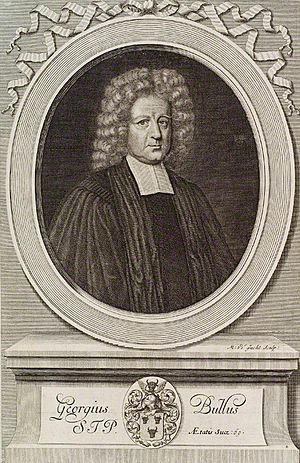George Bull facts for kids
Quick facts for kids
George Bull
|
|
|---|---|
 |
|
| Born | 25 March 1634 Wells, Somerset, England
|
| Died | 17 February 1710 (aged 75) Brecknock, Wales
|
| Nationality | English |
| Occupation | theologian, bishop |
George Bull (born March 25, 1634 – died February 17, 1710) was an important English thinker and a Bishop of St David's. A bishop is a high-ranking leader in the Christian church. He was known for his strong beliefs about Christian teachings.
Contents
Early Life and Education
George Bull was born in Wells, Somerset, England. This was on March 25, 1634. He went to school in Wells and then to Blundell's School in Tiverton. When he was young, he studied at Exeter College, Oxford. There, he became friends with Thomas Clifford.
In 1649, George Bull left the university. He then studied with William Thomas, a religious leader. Bull was especially influenced by Thomas's son, Samuel. Samuel suggested that Bull read books by famous religious writers like Richard Hooker.
Becoming a Priest
When he was 21, George Bull became a deacon and then a priest. This process is called ordination. He was ordained by Robert Skinner, who was a bishop. After this, Bull started working at a small church called St George's, near Bristol.
He often visited Oxford and met Alexander Gregory. In 1658, Bull married Gregory's daughter, Bridget. The wedding followed the rules of the Book of Common Prayer. This was a special book used for church services. At that time, using it was actually against the rules.
Life as a Rector
In the same year, Bull became the rector of Siddington St Mary's. A rector is a priest in charge of a church and its area. He later also took charge of Siddington St Peter's. He stayed in Siddington for 27 years. During this time, he sometimes faced disagreements with people in his church.
In 1686, he became an Archdeacon of Llandaff. This is another important role in the church. He also received a special degree called a D.D. from Oxford University. This was a high honor, even though he hadn't completed earlier degrees.
Later Years and Bishop Role
After the Glorious Revolution in 1688, George Bull became a local judge. In March 1705, he was made the Bishop of St David's. This meant he was a main leader for many churches in that area. However, he was already old and not well. He tried to visit his churches, but he became too sick. He lived in Brecknock until he passed away on February 17, 1710, at the age of 75. He was buried there.
His Religious Ideas
George Bull is known as a very important Anglican theologian. A theologian is someone who studies religious beliefs. He was especially respected for defending the idea of the Trinity. This is a core Christian belief about God. Even some Roman Catholic thinkers admired his work.
Bull had ideas that were different from some other thinkers of his time. He believed strongly in the importance of both faith and good actions in a person's life.
Important Books
George Bull wrote several important books in Latin. Most of them were about Christian beliefs. These books have since been translated into English.
The Harmonia Apostolica
His first major book was called Harmonia Apostolica. He wrote it to show how the teachings of Saint Paul and Saint James fit together. Some people thought their ideas about faith and good deeds were different. Bull argued that they actually agreed. He believed that good actions were just as important as faith for Christians. This book caused some debate among other religious leaders.
The Defensio
Some people wrongly thought Bull's ideas were similar to a group called the Socinians. To clear this up, he wrote his most famous book, Defensio Fidei Nicaenae (which means "Defense of the Nicene Faith"). This book was finished in 1680 and published in 1685.
In this book, Bull defended the idea that early Christian leaders believed in the full divinity of Christ. This means they believed Jesus was truly God. His book was very well-received and praised by many, including a famous French bishop named Jacques-Bénigne Bossuet.
Other Books on the Trinity
Bull wrote more books about the Trinity. His book Judicium Ecclesiae Catholicae (1694) continued to explain that early Christians believed in Christ's divinity. His last book on this topic was Primitiva et Apostolica Traditio. It argued against the idea that Christ's divinity was a new invention.
Other Writings
He also wrote Corruptions of the Church of Rome. This book was his answer to Bishop Bossuet, who wondered why Bull wasn't Catholic. It became very popular and was even translated into Italian. After his death, another book was published called A Companion to Candidates for Orders. This book talked about how important the job of a priest is. His son also published 20 of his sermons.

